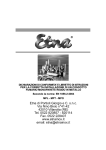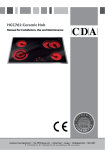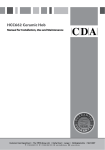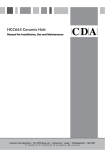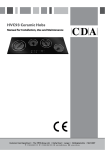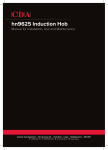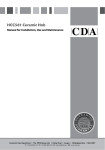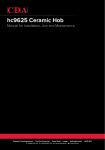Download HVC60 / 70 / 90 Ceramic Hobs
Transcript
HVC60 / 70 / 90 Ceramic Hobs Manual for Installation, Use and Maintenance Passionate about style Customer Care Department • The Group Ltd. • Harby Road • Langar • Nottinghamshire • NG13 9HY T : 01949 862 012 F : 01949 862 003 E : [email protected] W : www.cda.eu Important The CDA Group Ltd cannot be held responsible for injuries or losses caused by incorrect use or installation of this product. Please note that CDA reserve the right to invalidate the guarantee supplied with this product following incorrect installation or misuse of the appliance or use in a commercial environment. This appliance is not designed to be used by people (including children) with reduced physical, sensorial or mental capacity, or who lack experience or knowledge about it, unless they have had supervision or instructions on how to use the appliance by someone who is responsible for their safety. Under no circumstances should any external covers be removed for servicing or maintenance except by suitably qualified personnel. Appliance information: Please enter the details on the appliance rating plate below for reference, to assist CDA Customer Care in the event of a fault with your appliance and to register your appliance for guarantee purposes. Appliance Model Serial Number CE Declarations of Conformity: This appliance has been manufactured to the strictest standards and complies with all applicable legislation, including Electrical safety (LVD) 72/23/EEC and Electromagnetic interference compatibility (EMC) 289/336/EEC. Parts intended to come into contact with food conform to 89/109/EC. This appliance also conforms to requirements of directive 93/68/EEC. IMPORTANT INFORMATION FOR CORRECT DISPOSAL OF THE PRODUCT IN ACCORDANCE WITH EC DIRECTIVE 2002/96/EC. At the end of its working life, the product must be taken to a special local authority waste collection centre or to a dealer providing appliance recycling services. Disposing of a household appliance separately avoids possible negative consequences for the environment and health. It also enables the constituent materials to be recovered, saving both energy and resources. As a reminder of the need to dispose of household appliances separately, the product is marked with a crossed-out wheeled dustbin. 1 Please note: Before operating this hob, please read the instructions carefully After unpacking the appliance, make sure it is not damaged. In case of doubt, do not use the appliance and contact your supplier. Remove all packaging and do not leave the packing materials in easy reach of children as they may cause serious injury. The packaging materials are recyclable. Always disconnect the appliance from the power supply before undertaking any cleaning or maintenance. Ceramic hobs become hot and remain hot during and immediately after use. Do not touch the hob until it has been allowed to cool. After use, please ensure that all the zones have been switched off. Keep children away from the appliance when in use. Pan handles should never stand out beyond the edge of the worktop. This will ensure children cannot reach them. Do not use pans with rough bases (e.g. cast iron) as these may scratch the hob surface. Ensure the base of the saucepan is clean and dry before placing it on the zone. Do not switch on the zones without cookware in place. Do not lean over the hob when it is in use. Do not drop heavy or sharp objects on to the hob top. Do not scratch the hob top with sharp objects. Follow the cleaning instructions carefully. Never put cooking foil or plastic materials on the hob top when it is hot. These materials could melt and cause damage to the hob. Do not leave inflammable materials on the hob top. Never use the hob top for storage or as a worktop. Do not leave wet or damp pan lids on the hob. Important Do not use the hob if the glass surface is cracked or damaged to prevent risk of electric shock, Disconnect it from the power supply. Do not use the hob if the electrical cord is damaged. When correctly installed, this hob meets all the safety requirements laid down for this type of product. However, special care should be taken around the underneath of the appliance as this area is not designed or intended to be touched and may contain sharp or rough edges, that may cause injury. This hob (Class 3) has been designed for use only as a cooking appliance. Any other use (e.g. heating rooms) should be considered incorrect and therefore dangerous. This appliance is not intended to be operated by any means of an external timer or separate remote control system. Make sure that electrical cords connecting other appliance do not come into contact with the hob top. Before disposing of an unwanted appliance, it is recommended that it is made inoperative and that all potentially hazardous parts are removed. 2 Using your hob HVC60 Zones: 1. Front left 1.2 kW 140 mm 2. Rear left 2.3 kW 210 mm 3. Rear right 0.75/2.2 kW 120/210 mm dual 4. Front right 1.2 kW 140 mm Control panel: 5. Front left zone control 6. Rear left zone control 7. Rear right zone control 8. Front right zone control 9. Residual heat indicators 10. Power indicator light 2 3 1 4 5 6 7 9 8 10 Fig.1 HVC70 Zones: 1. Front left 1.2 kW 140 mm 2. Rear left 0.8/2.2 kW 180x260 mm oval dual 3. Rear right 1.2 kW 140 mm 4. Front right 0.75/2.2 kW 120/210 mm dual 3 2 Control panel: 5. Front left zone control 6. Rear left zone control 7. Rear right zone control 8. Front right zone control 9. Residual heat indicators 10. Power indicator light 4 1 5 6 7 9 8 10 Fig.2 HVC90 Zones: 1. Front left 1.8 kW 180 mm 2. Rear left 1.2 kW 140 mm 3. Centre 0.8/2.2 kW 180x260 mm oval dual 4. Rear right 0.75/2.2 kW 120/210 mm dual 5. Front right 1.2 kW 140 mm Control panel: 6. Front left zone control 7. Rear left zone control 8. Centre zone control 9. Rear right zone control 10. Front right zone control 11. Residual heat indicators 12. Power indicator light 3 2 4 3 1 5 6 7 8 11 Fig.3 9 10 12 How to use the hob The ceramic surface of the hob allows fast transmission of heat vertically from the heating elements under the glass to the pans on the hob top. The heat does not spread horizontally, so the hob top remains relatively cool only a few centimetres from the zone in use. Please note: The heating elements are equipped with a temperature limiter that will switch the element off to prevent damage to the hob. The temperature limiter may also operate when incorrect pans are used or pans are poorly positioned. This will affect cooking performance. The temperature limiter can be seen in the zone as the straight line out from the centre of the element. This is not a fault with the hob. Using the single zones The heating element is formed of a coil of resistant material which reaches the required cooking temperature quickly. Before using the hob, first check the hob and the pan are clean and dry, then place the pan correctly on to the zone. The power level for each zone can be regulated by turning the control knob to the required level between 0 (off) and 12 (maximum). Hi-light cooking zone Ø 140mm Hi-light cooking zone Ø 180mm Hi-light cooking zone Ø 210mm fig. 4 Second element The power indicator light will switch on automatically when any of the zones are in use. Using the dual zones The dual zones are formed of two separate coils of resistant material. To turn on the dual zone, turn the control knob fully clockwise to the position. Hi-light double zone Hi-light oval double zone fig. 5 Residual heat indicators The hob is equipped with residual heat indicators which warn when any of the zones are hot to the touch, both during and after cooking. A light will show on the display (fig 6 for HVC60/HVC70, fig 7 for HVC90) to indicate a zone is hot until the zone is at a safe temperature to touch, when the residual heat indicator will the switch off. fig. 6 Please note: You should avoid touching the zones when the hob is in use, or when the residual heat indicator is on. In the event of a power cut, the residual heat indicators will illuminate after the power supply is restored. However, when there is no power supply to the hob the residual heat indicators will not work, so extra care must be taken. fig. 7 4 How to use the hob Cooking zone settings TYPE OF COOKING Cooking zone setting 0 Switched OFF 1 2 For melting operations (butter, chocolate). 2 3 4 To maintain food hot and to heat small quantities of liquid (sauces, eggs). 4 5 6 To heat bigger quantities; to whip creams and sauces. (vegetables, fruits, soups). 6 7 Slow boiling, i.e.: boiled meats, spaghetti, soups, continuations of steam cooking of roasts, stews, potatoes. 6 7 For every kind of frying, cutlets, uncovered cooking, i.e.: risotto. 5 8 9 10 Browning of meats, roasted potatoes, fried fish, omelettes, and for boiling large quantities of water. 6 11 12 Fast frying, grilled steaks, etc. Switching on the second element (Double and oval zones only) 1 2 3 4 7 8 9 10 11 12 Heating Cooking Roasting-frying 5 fig.8 Efficient Use of your Hob The hob is equipped with zones of different sizes, designed to accommodate most shapes and sizes of pan. For best results, only use pans with flat bottoms and choose an appropriate zone depending on the size of the pan. The most efficient use of the hob is shown below, where the pan and zone are correctly chosen. Use pan lids where possible to minimize the energy usage of your appliance. To reduce the cooking time, set the control knob to its maximum position when you first switch the plate on. Once the zone has reached its temperature, then turn the control knob to the required position. As the zone will remain hot for a period of time after it has been switched off, five to ten minutes before the planned end of cooking time, turn the zone off. The residual heat in the hob will be sufficient to finish the cooking. Fig.9 Zone Size Minimum Pan Size (mm) 140 mm 110 Maximum Pan Size (mm) 160 180 mm 150 200 210 mm 180 230 120/210 dual 90/180 140/230 180 x 260 dual 150 160 (280 when dual zone in use) It is very important that the pans used on the hob are made of a suitable material and have the correct type of base. The base should be flat and smooth, as any rough part on the pan base could scratch the ceramic hob top. Choose pans which are between the sizes recommended in the table above, and with bases that are as non-reflective as possible, e.g. dull and dark. Only pans recommended for use on ceramic hobs should be used. Pans with aluminium bases may leave silver streaks or spots on the hob. Glassware and pans with rough circular machined bases should not be used 6 Care and Maintenance Always disconnect the appliance from the power supply before undertaking any cleaning or maintenance. You should use a non-abrasive cleaner to clean the hob top. Any abrasive cleaner (including Cif) will scratch the surface and could erase the control panel markings. Do not use steel wool, abrasive sponges or sharp utensils such as knives to clean the hob as these could damage the hob. The hob surface and the pans must be clean. Carefully remove any food remains (especially those containing sugar), dirt etc. as soon as is possible after spillage - using a ceramic hob scraper if necessary whilst the zone is still hot. Once they have cooled and hardened they become increasingly difficult to remove. Sugar, syrup and starch mixtures could permanently pit the hob surface if left to burn on and should be removed as quickly as possible after spillage. The stainless steel trims should be rinsed with water and dried with a soft, clean cloth, a chamois leather or an E-Cloth. If necessary, the control knobs can be removed for cleaning, but you should take care not to damage the seal nor to allow water inside the hob itself. All cleaner residues should be removed with a damp cloth. Types of residues Clean with Cleaning advice Light Cleaning sponge and soft cloth Wipe over the zone to be cleaned with a sponge and hot water, and then wipe off with a soft dry cloth. Accumulated baked-on stains/ dirt, sugar spills or melted plastics Cleaning sponge or glass scraper and soft cloth Wipe over the zone to be cleaned with a sponge and hot water, using a ceramic scraper to remove any large marks or stains and then wipe off with a soft dry cloth. Rings and hard water residues White vinegar and soft cloth Pour a small amount of warm white vinegar onto the stain, leave it to stand, and then wipe off with a soft dry cloth. Important: • Steam cleaners must not be used when cleaning this appliance. Mains electrical voltage: 230 – 240Vac Total rated electrical consumption: HVC60 6.9 kW HVC70 6.8 kW HVC90 8.6 kW If your Hob is not working: 1. Check that the control knobs are switched on. 2. Check that the mains supply has not been switched off. 3. Check that the fuse in the spur has not blown. Contact CDA Customer Care A : Customer Care Department, The CDA Group Ltd, Harby Road, Langar, Nottinghamshire, NG13 9HY T : 01949 862 012 F : 01949 862 003 E : [email protected] W : www.cda.eu 7 Mains Electricity Connection Warning! this appliance must be earthed We recommend that the appliance is connected by a qualified electrician, who is a member of the N.I.C.E.I.C. and who will comply with the I.E.E. and local regulations. C This appliance is intended to be connected to fixed wiring and is not suitable for connection to a 13A plug or 13A supply. A This appliance is intended to be connected to fixed wiring by a double pole switch, having a contact separation of at least 3mm in all poles. The switch must be positioned no further than 2m from the appliance. B B Fig.10 Please note: C 2 1 E L Fig.11 5 E • This appliance is intended to be connected to the mains supply with a cable of cross section area 2.5 mm² (HVC60/70) or 4mm² (HVC90). A larger cable will not fit the terminal connections. • The marking of the current rating of the fuse or circuit breaker protecting this appliance should be marked on the socket outlet. G 4 The mains cable must only be replaced by a qualified electrician or service engineer and must be of equivalent or better rating (i.e. 2.5 mm² for HVC60/HVC70, 4mm² for HVC90, HO5RR-F, HO5VV-F or H05V2V2-F). 3 • F N D • Assembly and electrical connection should be carried out by specialised personnel. • When installing this product we recommend you seek the help of another individual. • Ensure that the brass links are securely fitted. Failure to do so will prevent the hob from operating correctly. 8 Fitting the Hob Unpacking the hob:• Take care not to lose or mishandle any parts. Fitting position of the hob: This appliance must be installed a minimum of 50mm from any back wall and a minimum of 190mm away from any adjacent vertical surfaces, e.g. a tall cupboard end panel. This may be reduced to 100mm if the adjacent surface is resistant to fire (tiles or steel, for example). These dimensions are shown in Fig.12. If fitting a cooker hood above the hob: If a cooker hood is to be installed above the hob, the height of the hood above the hob must be at least 600mm (650mm is recommended) (Fig.13). If the instructions supplied with the hood dictate that the hood must be installed at a height greater than 600mm, then that height is the minimum required. Wall furniture requirements: The minimum height of any cabinet immediately above the hob is 900mm. The minimum height of any adjacent units (including light pelmets) is 400mm, unless they are manufactured from a material resistant to fire (steel, for example) Notes: • Do not position this appliance above a refrigeration unit. The heat generated may cause the refrigeration unit to fail. • This appliance is designed to be installed into cabinet units capable of withstanding temperatures of 65°C or greater above ambient temperature. • If there is no oven to be built in below the hob, an isolation shelf should be fitted to protect the user from high temperatures. If the hob is to be installed above a working drawer, then a partition should be fitted to protect the contents and user from the heat generated during use. • Never place perishable foods in the cupboard below the appliance. 9 How to Install the Hob How to install the hob: Overall dimensions of the hob: HVC60 Width 590mm Depth 510mm HVC70 Width 770mm Depth 510mm HVC90 Width 900mm Depth 510mm Worktop cut-out dimensions: 1. 2. 3. HVC60 Width 560mm Depth 490mm HVC70 Width 740mm Depth 490mm HVC90 Width 870mm Depth 490mm Make the required hole in the worktop. Before doing this, you must check the instructions supplied with any cooker hood to ensure that you will have the required clearance. The cut-out (Fig.12) shows a 60mm gap from the wall to the cut-out edge. The distance from the hob, when fitted, to the back wall is 50mm. If a splashback/worktop upstand is to be fitted, take this into account when cutting the hole. The minimum distance that the hob should be positioned away from the rear wall or splashback is 50mm. Position the hob seal, as shown in (Fig.14), ensuring that the ends meet without overlapping. Do not use silicone type sealant. Secure the hob to the worktop using the fixing brackets and screws supplied, as shown in (Fig.15). Remove any excess sealant after tightening the brackets. Do not over-tighten the fixing brackets. 400mm 490mm 470mm 650mm 60mm 65mm 560mm 550mm 150mm 185mm 190mm 740mm 870mm 150mm 185mm 190mm Fig.12 Fig.13 3cm Fig.14 4cm Fig.15 10 To contact our Customer Care Department, or for Service, please contact us on the details below. Passionate about style Customer Care Department • The Group Ltd. • Harby Road • Langar • Nottinghamshire • NG13 9HY T : 01949 862 012 F : 01949 862 003 E : [email protected] W : www.cda.eu













